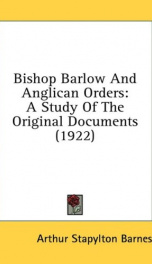bishop barlow and anglican orders a study of the original documents

TO HIS EMINENCE FRANCIS AIDAN CARDINAL GASQUET EMINENCE, Had this book, which you have graciously allowed me to dedicate to you, been published five and twenty years ago, by which time many of the preliminary studies for it had already been made, it would have been regarded as a controversial production. For at that time the question of the validity of Anglican Orders was still the subject of active discussion and was in process of examination by the Commission appointed by Leo XIII, of which your Eminence was so distinguished a member. Now that the question has been decided by authority at Rome, the book has no longer the same controversial value. The story of Bishop Barlow is, however, in itself so curious, and throws so much light on the inner workings of that historical period, that I hope its publication may be thought to be justified as a study purely historical, even if without practical influence in the controversies of to-day. From the first the Catholic objections to Anglican Orders took two main forms, the one historical and the other theological. that the historical chain had been broken and It was argued, that is, either Apostolical Succession thereby lost or else, that even if the material succession had been retained, the form of service employed had been insufficient to hand on the grace of Holy Order, so that the same result had followed. The Commission might, it would appear, have based its finding on either of these arguments or on both combined. But the Bull Apostolicae Curae, the result of their deliberations and ofthe advice which they gave tothe Pope, did in fact base its decision solely upon the second or theological argument an argu ment which was never put more clearly or succinctly than by Sancta Clara, the Franciscan writer in the time of Charles I, who first tried to prove that there was no essential opposition between the Thirty-nine Articles and the Council of Trent. All ordinations, he wrote, which are celebrated in a form different from the Church, with an intention sufficiently ex are invalid. pressed of opposition to her sense, The historical argument, this other being alone was not amply sufficient for the purpose required, needed, and therefore no appeal was made to it in the Bull. It remained, of course, exactly as cogent and decisive as before. To omit to use an argument, when others are available which are sufficient without its use, is not to throw any doubt upon its efficacy and power. This, however, Anglican controversialists have never been able to see. Because Leo XIII did not care to use the argument from history, having all that he needed ready to hand in the argument from theology, they have spoken as if he had pronounced 1 An Encheiridion of Faith, by Francis Coventry 2nd edit., Douai, 1655. Francis Coventry was one of his pen names. the historical argument unsound and devoid of utility, which is very far from being true... --This text refers to the Paperback edition.
Info about the book
Author:
Series:
Unknown
ISBN:
1115209809
Rating:
3.5/5 (5)Your rating:
0/5
Languge:
English
Users who have this book
Users who want this book
What readers are saying
What do you think? Write your own comment on this book!
write a commentif you like bishop barlow and anglican orders a study of the original documents try:
Other books by this author
Do you want to read a book that interests you? It’s EASY!
Create an account and send a request for reading to other users on the Webpage of the book!


